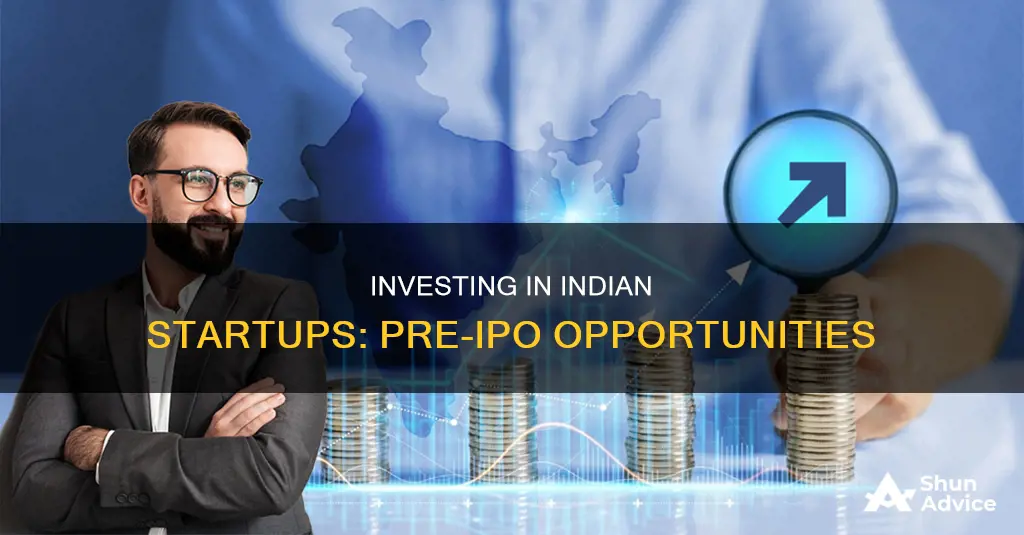
Investing in startups before they go public through an Initial Public Offering (IPO) is known as pre-IPO investing. In the past, pre-IPO shares were mostly available to large institutions like banks, private equity firms, and hedge funds. However, it is now possible for smaller investors to get involved. Pre-IPO shares are stocks in companies that have not yet gone public, and by investing at this stage, one can become an early shareholder and benefit from the company's growth. The main appeal of pre-IPO investing is the opportunity to buy shares at a lower price before they become fully valued on the public market. However, it is important to note that pre-IPO investing carries risks, including the possibility of a company failing or an IPO being delayed or cancelled.
| Characteristics | Values |
|---|---|
| Definition | Investing in a company before it officially goes public through an Initial Public Offering (IPO) |
| Who can invest? | Retail investors, high net worth individuals (HNIs) and family offices |
| Benefits | Get in early while shares are still underpriced; profit from the company's growth; avoid the risk of not getting shares in an oversubscribed IPO |
| Risks | IPO may flop or be cancelled; company may shut down; illiquidity; irreversible loss |
| Time horizon | 3-5 years |
| Expected returns | 20-25% |
What You'll Learn
- Pre-IPO funds are a relatively new asset class in India
- The minimum investment in pre-IPO funds is 1 crore INR
- Pre-IPO funds allow high-net-worth individuals to invest in fast-growing companies
- Pre-IPO shares are stocks in companies that haven't yet gone public
- Pre-IPO investing can be risky due to uncertain valuations and higher failure rates

Pre-IPO funds are a relatively new asset class in India
Pre-IPO funds offer investors access to rapidly growing mid-sized businesses with proven business models and strong fundamentals that are preparing to go public within the next three to five years. By investing in these companies before they go public, HNIs and family offices can benefit from the potential upside associated with the IPO process.
One of the key advantages of pre-IPO funds is that they are not subject to the mandatory lock-in period for the sale of shares imposed by the Securities and Exchange Board of India (SEBI). This means that investors in pre-IPO funds can liquidate their holdings as soon as the company goes public, reducing the time to realize capital gains.
To invest in pre-IPO funds, individuals should approach a financial advisor or expert to understand the different funds available and their investment strategies. These funds are usually only open for investment during a specific time period when they are recently launched and seeking capital. It is important for investors to carefully evaluate the fund's focus, credentials of fund managers, holding period, and historical returns before making a decision.
While pre-IPO funds offer attractive investment opportunities, it is important to remember that they carry certain risks. These include the possibility of overvaluation, changes in market sentiment, governance and regulatory roadblocks, and profitability requirements. As with any investment, it is crucial for individuals to conduct thorough due diligence and seek professional advice before committing their capital.
Savings vs Investments: Where Should Your Money Go?
You may want to see also

The minimum investment in pre-IPO funds is 1 crore INR
How to Invest in Startups Before IPO in India
Pre-IPO funds are a relatively new asset class in India, allowing investors to buy shares in private companies before they go public through an Initial Public Offering (IPO). These funds are typically launched by venture capital funds, private equity funds, and asset management companies (AMCs).
According to guidelines set by the Securities and Exchange Board of India (SEBI), the minimum investment in pre-IPO funds is 1 crore INR. This high minimum investment is because pre-IPO funds are targeted at high net worth individuals (HNIs) and family offices.
How to Invest in Pre-IPO Funds
- Consult a Financial Advisor: Speak to your financial advisor or expert to understand the various pre-IPO funds available in India. They can guide you on the different funds run by venture capital, private equity, and asset management companies.
- Research the Investment Strategy: Go through the investment strategy, targets, and prospectus of the pre-IPO funds that interest you. Understand factors such as the focus of investment, credentials of fund managers, holding period, and historical returns.
- Connect with Fund Representatives: Once you've decided on a fund, set up a call with their representatives to understand the application process and legal requirements for completing your investment.
- Track Your Investment: Regularly monitor the activities of your investment and stay updated by taking guidance from your fund representatives.
Benefits of Pre-IPO Investing
Pre-IPO investing offers several advantages over traditional IPO investments:
- Higher Profits: Pre-IPO investors can make higher profits by buying shares at a lower price before the company goes public.
- Assured Allotment: Pre-IPO investments assure allotment, avoiding the uncertainty of whether you will receive shares during an IPO due to oversubscription.
- No Mandatory Lock-in: Pre-IPO funds are not subject to the mandatory lock-in period mandated by SEBI for existing investors, allowing investors to liquidate their holdings as soon as the company goes public.
- Experienced Entrepreneurs: Many pre-IPO companies are led by seasoned entrepreneurs who have already proven their ability to run successful businesses.
- Solid Business Model: Pre-IPO companies often have well-established business models with strong fundamentals, reducing the risk of investment.
Risks of Pre-IPO Investing
Despite the potential benefits, it's important to consider the risks associated with pre-IPO investing:
- Exit Dependence: Pre-IPO investments depend on the company eventually conducting an IPO or another liquidity event to provide an exit for investors. Delays or cancellations of IPOs can impact your ability to sell your shares.
- Market Sentiment Changes: Public market sentiment towards a company may change between the time of your pre-IPO investment and the IPO, affecting the demand and pricing of shares.
- Regulatory Compliance: Companies going public must adhere to various compliances and regulations, and delays in meeting these requirements can postpone the IPO.
- Profitability Concerns: Startups focused on rapid growth may struggle with profitability, potentially leading to delays in listing or underperformance.
In conclusion, while pre-IPO investing in India offers the potential for high returns, it is essential to carefully evaluate the risks and conduct thorough due diligence before making any investment decisions.
Becoming a Financial Investment Manager: Key Steps
You may want to see also

Pre-IPO funds allow high-net-worth individuals to invest in fast-growing companies
Pre-IPO funds are a relatively new asset class that allows high-net-worth individuals (HNIs) and family offices to invest in privately-held companies that are looking to go public in the next three to five years. These funds are typically launched by venture capital funds, private equity funds, and asset management companies.
Investing in pre-IPO companies offers several benefits. Firstly, it allows investors to get in on the ground floor of companies led by experienced entrepreneurs with profitable business models. Secondly, pre-IPO companies usually have well-developed business plans, giving investors more information about their future growth prospects. Thirdly, private companies tend to focus more on long-term success, maintaining higher standards, and delivering better products.
Another advantage of pre-IPO investing is the opportunity for networking and building relationships with successful startups. By connecting with these companies early on, investors can expand their network and gain access to more investment opportunities down the line.
Additionally, pre-IPO stocks can be purchased at a lower price compared to IPOs, offering better value for money. The potential for high returns is also significant, as investors who buy stocks in the primary market experience fewer price fluctuations and no sudden corrections.
However, it is important to note that pre-IPO investing carries certain risks. One of the main risks is information asymmetry, where private companies are not required to disclose as much financial data as listed companies, creating an information imbalance between insiders and external investors. Company failure and market volatility are also risks to consider, as pre-IPO companies have higher failure rates compared to established public companies.
To mitigate these risks, investors should conduct thorough due diligence, assess the company's fundamentals, and evaluate the probability of the company going public. Diversification across multiple pre-IPO investments can also help reduce the impact of individual company failures.
In India, pre-IPO funds serve as an opportunity for domestic investors to participate in the growing financial ecosystem. According to the Securities and Exchange Board of India (SEBI) guidelines, a minimum investment in pre-IPO funds is INR 1 crore. Investors can approach financial advisors or experts to understand the various pre-IPO funds available and make informed investment decisions.
Comparing Portfolio Investments: Strategies for Success
You may want to see also

Pre-IPO shares are stocks in companies that haven't yet gone public
How Pre-IPO Investing Works
Pre-IPO investing allows individuals to participate in a company's journey before it is listed on a public stock exchange, granting access to shares usually reserved for institutional investors. This provides a unique investment opportunity before the company's public debut.
There are two main ways that pre-IPO shares are made available:
- The company issues new shares and sells them to investors like venture capitalists, angel investors, or other big players through a private deal.
- Existing shareholders, such as early investors or employees, sell their shares before the company goes public, often through brokers.
Advantages of Pre-IPO Investing
- High Return Potential: Pre-IPO investments can yield substantial returns if the company's value increases significantly after its IPO. As companies are staying private longer, more of their growth is happening in private markets, leaving less upside for public market investors.
- Early Bird Advantage: Pre-IPO investors get to support innovative companies that are shaping the future and disrupting industries.
- Exclusivity: Pre-IPO investors gain access to companies that aren't available to the general public and offer unique investment potential.
- Diversification: Pre-IPO investments add variety to your portfolio, possibly reducing risk through lower correlation to traditional asset classes, with the potential for lower volatility.
Disadvantages of Pre-IPO Investing
- Risk of Loss: As with any investment, there is a potential for loss if the company goes out of business.
- Liquidity Issues: Pre-IPO shares are less liquid than public stocks, making them harder to sell quickly.
- Information Asymmetry: Private companies do not have the same disclosure and reporting requirements as public companies, making it challenging to make fully informed decisions.
Who Can Invest in Pre-IPO Stocks?
Historically, pre-IPO investments were almost exclusively available to large, institutional investors and the very wealthy. However, due to changes in regulations and the emergence of investment marketplaces, pre-IPO investments are now more accessible to accredited investors as well.
Accredited investors typically have an annual income above $200,000 individually or $300,000 jointly, or a net worth over $1 million, excluding their primary residence.
Evaluating Pre-IPO Investment Opportunities
When evaluating a pre-IPO investment opportunity, it is important to consider the company's financial health, market potential, leadership team, and broader market trends. Here are some key factors to look for:
- Financial Health: Are revenues growing? Are they profitable? When did they last raise funding?
- Market Potential: How big is the market, and what is the company's role in it?
- Leadership Team: What is the experience and track record of the executives and board members? Are they backed by top-tier venture capitalists?
- Terms of the Stock Offering: What type of shares are being offered (common or preferred), and what is the pricing?
- Industry and Broader Market Trends: How might macroeconomic and industry movements impact the company and your investment?
Portfolio Strategies for Exponential Growth: Secrets to Success
You may want to see also

Pre-IPO investing can be risky due to uncertain valuations and higher failure rates
Pre-IPO investing in India can be a risky endeavour due to uncertain valuations and higher failure rates. While it may offer the potential for high returns, investors should be aware of the risks involved. One of the main risks is the uncertain valuation of the company. Pre-IPO companies may not have a proven financial history, making it difficult to accurately value the company and determine a fair share price. This can result in overvaluation, where investors pay a premium for the shares, expecting high returns that may not materialise.
Additionally, the high failure rate of startups also contributes to the riskiness of pre-IPO investing. It is estimated that 90% of startups fail, with 70% of them shutting down within the first five years. This means that there is a significant chance that an investor's money will be lost if the startup does not succeed. Startups are often in a high-growth phase and may focus more on scalability than profitability, which can lead to financial instability and a higher risk of failure.
Another risk factor is the lack of liquidity in pre-IPO investments. Equity in startups is considered relatively illiquid, as it is more difficult to sell compared to public company stocks. Investors in pre-IPO companies may face challenges in selling their shares before the IPO, as there are often restrictions on secondary sales. This lack of liquidity can result in a forced long-term investment, where investors are unable to exit their positions if the company's prospects deteriorate.
Furthermore, there is also the risk that the IPO may not happen as planned. The IPO process is subject to regulatory approvals and market conditions, and there is a possibility that the company may decide to delay or cancel the IPO. This can leave pre-IPO investors in a difficult position, as they may be unable to monetise their holdings as anticipated.
Lastly, pre-IPO investing is often associated with higher risk due to the early stage of the company's development. Investing in a company before it goes public means that there is limited financial information available, and the company's business model and growth prospects may not be fully proven. This uncertainty can make it challenging for investors to make informed decisions and accurately assess the risks and potential returns.
In conclusion, while pre-IPO investing in India may offer attractive opportunities for high returns, it is important for investors to carefully consider the risks involved. The uncertain valuations, higher failure rates, lack of liquidity, and regulatory uncertainties can all contribute to the riskiness of pre-IPO investments. Conducting thorough due diligence, diversifying investments, and seeking guidance from experienced investors can help mitigate these risks.
Understanding India VIX: A Guide to Investing in Volatility
You may want to see also
Frequently asked questions
Pre-IPO investing is when you buy shares in a startup before it has gone public. In the past, pre-IPO shares were mostly available to big players like banks, private equity firms and hedge funds. But now, it's possible for retail investors to get involved too.
Pre-IPO funds are a relatively new asset class in India. These funds are generally launched by venture capital funds, private equity funds and asset management companies. According to the Securities and Exchange Board of India (SEBI), the minimum investment in these types of funds is 1 crore INR. Therefore, high-net-worth individuals (HNIs) and family offices looking to invest in growth-stage companies can invest in pre-IPO funds.
Pre-IPO investing is considered risky because many startups fail to return investors' money, and it is relatively more difficult to sell startup equity before the company IPOs. There is also the risk that the IPO gets delayed or the startup gets shut down.







